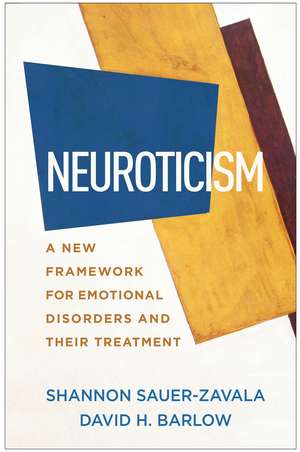Neuroticism: A New Framework for Emotional Disorders and Their Treatment
Autor Shannon Sauer-Zavala, David H. Barlowen Limba Engleză Hardback – 3 noi 2021
Preț: 273.26 lei
Nou
52.30€ • 54.02$ • 43.52£
Carte disponibilă
Livrare economică 04-18 martie
Livrare express 18-22 februarie pentru 30.93 lei
Specificații
ISBN-10: 1462547184
Pagini: 270
Dimensiuni: 152 x 229 x 25 mm
Greutate: 0.41 kg
Ediția:1
Editura: Guilford Publications
Colecția Guilford Press
Public țintă
Professional Practice & DevelopmentCuprins
2. Triple Vulnerability Theory and the Origins of Neuroticism
3. Integrating Temperament into the Study of Emotional Disorders
4. Neuroticism and a Functional Understanding of Emotional Disorders
5. Nosology and Assessment
6. Treatment of Neuroticism
7. Personality as a Basis for Treating Mental Disorders
References
Index
Recenzii
"This book offers a fascinating view of mental disorders that focuses on neuroticism as a transdiagnostic factor underlying many forms of psychopathology. Written by foremost treatment developers, the book not only presents a cutting-edge theoretical model, but also addresses what this means for assessment, and, most important, intervention. It provides a compelling discussion of novel therapies that target underlying vulnerabilities instead of symptoms of specific disorders. I highly recommend this book for use in graduate courses in clinical psychology. It should be of great interest to anyone interested in understanding and treating psychopathology."--Jutta Joormann, PhD, Department of Psychology, Yale University
"Astounding in its breadth, depth, and sophistication. Sauer-Zavala and Barlow have produced a book that is likely to be frequently utilized by clinicians, researchers, and students. The authors convincingly argue that restricting assessment and treatment to narrowly defined diagnostic categories is less effective than addressing the higher-order factors that cause emotional disorders. They use detailed clinical examples to illustrate the Unified Protocol, showing how the theory and research can be translated into practice."--Deborah Dobson, PhD, RPsych, Department of Psychology, University of Calgary; private practice, Calgary, Alberta, Canada-Given the broad scope of material covered, the book should be considered the definitive statement describing research and clinical practice. It is essential reading for all clinical professionals in psychology, psychiatry, and social work and for upper-level, preprofessional students….Essential.--Choice Reviews, 5/1/2022
Notă biografică
David H. Barlow, PhD, ABPP, is Professor Emeritus of Psychology and Psychiatry and Founder and Director Emeritus of the Center for Anxiety and Related Disorders at Boston University. Dr. Barlow has published over 650 articles and chapters and over 90 books and clinical manuals, mostly on the nature and treatment of emotional disorders and clinical research methodology. His books and manuals have been translated into more than 20 languages. Dr. Barlow’s numerous awards and citations include psychology's three highest honors: the Distinguished Scientific Award for the Applications of Psychology from the American Psychological Association, the James McKeen Cattell Fellow Award from the Association for Psychological Science, and the Gold Medal Award for Life Achievement in the Practice of Psychology from the American Psychological Foundation.
Descriere
Neuroticism--the tendency to experience negative emotions, along with the perception that the world is filled with stressful, unmanageable challenges--is strongly associated with anxiety, depression, and other common mental health conditions. This state-of-the-art work shows how targeting this trait in psychotherapy can benefit a broad range of clients and reduce the need for disorder-specific interventions. The authors describe and illustrate evidence-based therapies that address neuroticism directly, including their own Unified Protocol for transdiagnostic treatment. They examine how neuroticism develops and is maintained, its relation to psychopathology, and implications for how psychological disorders are classified and diagnosed.
